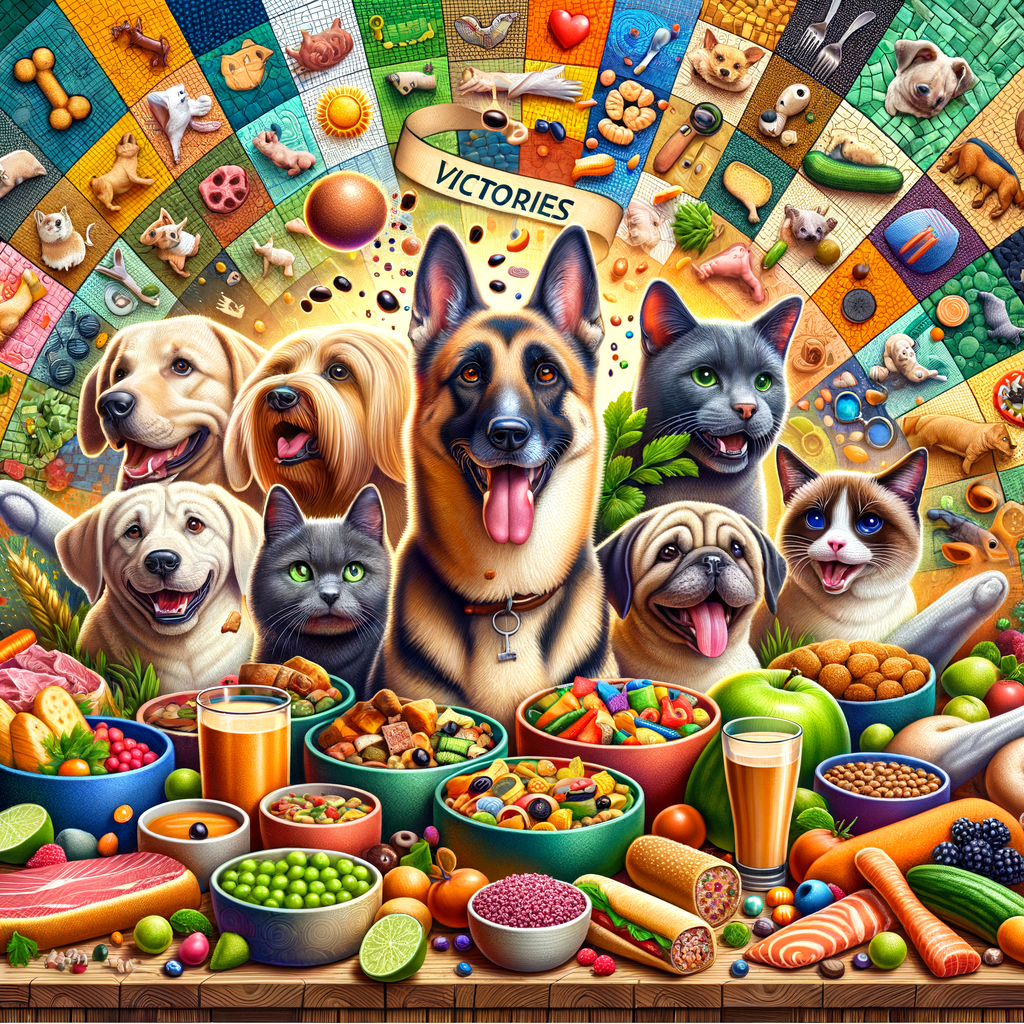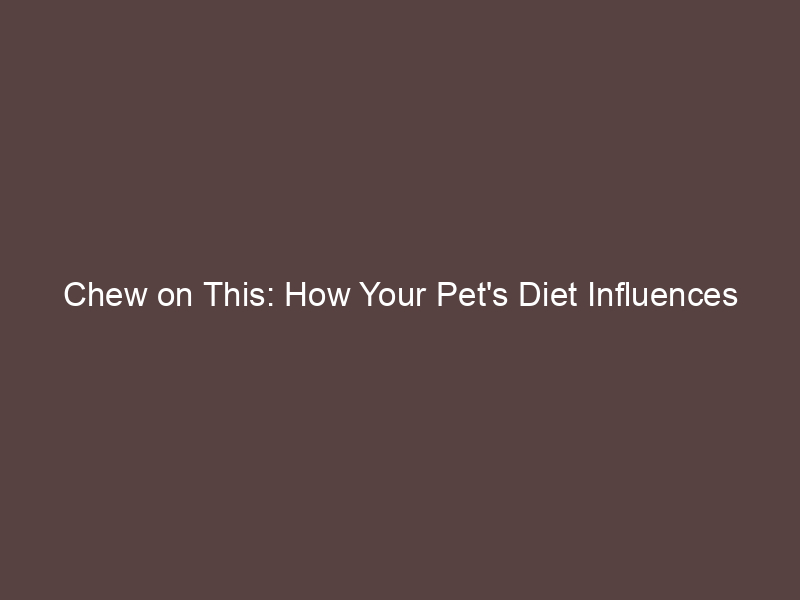
Pet Nutrition Success Stories
Let’s explore some inspiring stories of pets who have transformed their health through proper nutrition.
-
Case Study: From Junk Food Junkie to Health Nut
Meet Max, a lovable Labrador Retriever who was once a junk food junkie. Max’s owners used to feed him table scraps and treats, which led to weight gain and lethargy. After a stern warning from the vet, they decided to switch Max to a balanced, nutritious diet.
Max’s new diet included high-quality pet food, rich in proteins, vitamins, and minerals. It took a while for Max to adjust, but soon he began to show signs of improvement. His energy levels increased, his coat became shinier, and he lost the excess weight. Today, Max is a healthy and happy dog, thanks to his nutritious diet.
-
Success Story: The Power of a Balanced Diet
Next, we have Bella, a Persian cat who was suffering from hair loss and dull fur. Her owners were feeding her a diet high in carbohydrates, which was not suitable for her breed. After consulting with a pet nutritionist, they switched Bella to a balanced diet.
This diet included high-quality cat food, rich in proteins and essential fatty acids. Within a few months, Bella’s fur started to grow back, and it was shinier than ever. Her energy levels also improved, and she became more playful. Bella’s story is a testament to the power of a balanced diet.
-
Triumph: Overcoming Obesity with Proper Nutrition
Lastly, let’s talk about Rocky, a Beagle who was severely overweight. Rocky’s owners were feeding him large portions of food, leading to obesity. After a health scare, they decided to take control of Rocky’s diet.
They started feeding Rocky smaller portions of high-quality dog food, supplemented with fresh fruits and vegetables. They also ensured that Rocky got plenty of exercise. It was a long journey, but Rocky managed to lose the excess weight. Today, he is a fit and healthy Beagle, all thanks to proper nutrition.
These success stories show the importance of proper pet nutrition. By feeding your pets a balanced, nutritious diet, you can help them live healthier, happier lives.
Healthy Eating Habits for Pets
As a pet owner, you have a responsibility to ensure that your pet maintains a healthy diet. This involves regular vet check-ups and a good exercise regime. Let’s delve into these aspects.
Celebrating Pet Health
Keeping our pets healthy is a cause for celebration. It’s a testament to the care and dedication we put into ensuring they lead happy, healthy lives. Two key aspects of pet health are regular vet check-ups and exercise.
- How Regular Vet Check-ups Can Help Maintain a Healthy Diet
- The Role of Exercise in Pet Health
Regular vet check-ups are crucial for maintaining your pet’s health. Vets can provide valuable advice on the best diet for your pet based on their breed, age, and health condition. They can also detect any health issues early, allowing for timely treatment. For example, a vet may notice signs of obesity, a common issue in pets, and recommend a diet and exercise plan to help your pet lose weight.
Exercise plays a significant role in pet health. It helps keep your pet’s weight in check, improves their mood, and strengthens their muscles and bones. Regular exercise, combined with a balanced diet, can significantly improve your pet’s health and longevity. For example, a daily walk or play session can help your dog maintain a healthy weight and reduce the risk of heart disease.
In conclusion, regular vet check-ups and exercise are essential for maintaining your pet’s health. By incorporating these habits into your pet care routine, you can ensure that your pet leads a happy, healthy life.
Nutritional Success in Pets
Every pet owner wants their furry friend to be healthy and happy. One of the best ways to achieve this is through proper nutrition. Let’s explore the importance of a balanced diet, how to transition your pet to healthier eating habits, and some inspiring success stories.
- Understanding the Importance of a Balanced Diet
- How to Transition Your Pet to a Healthier Diet
- Success Stories: Pets Who Have Thrived on a Healthy Diet
A balanced diet is crucial for your pet’s overall health. It provides the necessary nutrients that help in growth, energy production, and disease prevention. A balanced diet for pets typically includes proteins, carbohydrates, fats, vitamins, and minerals. Each of these nutrients plays a unique role in maintaining your pet’s health.
| Nutrient | Role |
|---|---|
| Proteins | Help in growth and repair of body tissues |
| Carbohydrates | Provide energy |
| Fats | Support skin and coat health, and provide energy |
| Vitamins and Minerals | Support immune system and overall health |
Transitioning your pet to a healthier diet should be a gradual process. Start by mixing a small amount of the new food with the old food. Gradually increase the proportion of the new food while decreasing the old food over a week. This slow transition can help avoid digestive upset. It’s also important to monitor your pet’s reaction to the new diet. If they show signs of discomfort or disinterest, consult your vet for advice.
Many pet owners have seen remarkable improvements in their pets’ health after switching to a balanced diet. For instance, Max, a seven-year-old Labrador, was overweight and lethargic. His owner decided to switch him to a diet rich in proteins and low in fats. Within a few months, Max lost weight and became more active and playful.
Another success story is that of Bella, a four-year-old cat. Bella had a dull coat and was often sick. Her owner introduced a diet packed with essential vitamins and minerals. Bella’s coat became shinier, and her overall health improved significantly.
These stories highlight the power of a balanced diet in enhancing your pet’s health and wellbeing.
In conclusion, a balanced diet is a cornerstone of your pet’s health. It’s never too late to start your pet on a healthier diet. Remember, every small step towards healthier eating habits can make a big difference in your pet’s life.
Healthy Pet Diets
When it comes to our furry friends, their diet plays a significant role in their overall health and well-being. Just like humans, pets require a balanced diet to maintain their vitality and longevity. Let’s delve into the world of pet food nutrition and understand how to make the best dietary choices for our pets.
Pet Food Nutrition
Pet food nutrition is a complex subject, but it’s essential to understand it to provide the best care for your pets. Here are some key points to consider:
- Decoding Pet Food Labels: What to Look For
- The Benefits of Natural and Organic Pet Foods
Reading pet food labels can be confusing, but it’s a crucial step in ensuring your pet gets a balanced diet. Look for foods that list a source of animal protein, like chicken or beef, as the first ingredient. Avoid foods with artificial colors, flavors, or preservatives. Also, check for the AAFCO (Association of American Feed Control Officials) statement, which ensures the food meets minimum nutritional requirements.
Natural and organic pet foods can offer several benefits. They are free from artificial additives, which can cause allergies and other health problems in pets. They often contain higher quality ingredients, which can lead to better coat condition, fewer digestive problems, and increased overall health. However, it’s important to note that “natural” and “organic” are not always synonymous with “healthy”. Always check the ingredients and nutritional information to ensure the food is balanced and suitable for your pet.
In conclusion, understanding pet food nutrition and choosing the right diet for your pet can significantly improve their health and quality of life. Remember, every pet is unique, and what works for one may not work for another. Always consult with your vet before making significant changes to your pet’s diet.
Healthy Eating for Dogs and Cats
Just like humans, our pets also need a balanced diet to stay healthy. But, what does a balanced diet look like for dogs and cats? Let’s dive in and explore this topic.
- Species-Specific Nutrition: What’s Best for Your Pet
- Common Food Allergies in Dogs and Cats
- How to Encourage Healthy Eating Habits in Picky Eaters
- Introduce new foods gradually: If you want to change your pet’s diet, do it slowly. This can help them adjust to the new taste and texture.
- Stick to a feeding schedule: Pets thrive on routine. Feeding them at the same times each day can help them get used to eating regularly.
- Make mealtime fun: Try using puzzle feeders or hiding food around the house. This can make mealtime more interesting for your pet.
Every animal species has unique nutritional needs. Dogs are omnivores, meaning they can eat both meat and plants. Cats, on the other hand, are obligate carnivores. This means they need a diet high in meat. It’s important to feed your pet food that is specially designed for their species. For example, dog food often contains grains and vegetables, while cat food is mostly meat.
Just like people, pets can also have food allergies. Some dogs and cats may be allergic to certain proteins in their food. Common signs of food allergies in pets include itching, red skin, and stomach problems. If you notice these signs in your pet, it’s best to consult with a vet. They can help you identify the allergen and suggest a suitable diet for your pet.
Some pets can be picky eaters. This can make it challenging to ensure they’re getting the right nutrients. Here are a few tips to encourage healthy eating habits in your pet:
In conclusion, providing a balanced diet for your pet is crucial for their health. Remember to consider their species-specific nutritional needs, watch out for food allergies, and encourage healthy eating habits. With these tips, you can ensure your pet is eating right and staying healthy.
Benefits of Healthy Pet Eating
Feeding your pet a healthy diet can have a significant impact on their overall health and well-being. In this section, we will explore some real-life examples of how proper nutrition can transform a pet’s life.
Stories of Pet Nutrition
Here are some inspiring stories that highlight the importance of pet nutrition.
- How a Healthy Diet Transformed My Pet’s Life: A Personal Story
- Case Study: The Impact of Nutrition on a Pet’s Lifespan
Meet Bella, a Labrador Retriever who was overweight and lethargic. Her owner decided to make a change and switched Bella to a balanced, nutritious diet. Within a few months, Bella lost weight, her energy levels increased, and her coat became shinier. This transformation was a clear testament to the power of a healthy diet.
In a study conducted by researchers, it was found that pets fed a balanced diet lived an average of 1.8 years longer than those fed a standard commercial diet. This case study underscores the importance of nutrition in extending a pet’s lifespan.
These stories illustrate the profound impact that a healthy diet can have on a pet’s life. By providing your pet with the right nutrition, you can improve their health, increase their lifespan, and enhance their quality of life.
Pet Health and Nutrition
When it comes to our furry friends, their health and nutrition should be a top priority. Just like humans, pets can greatly benefit from a balanced and nutritious diet. Let’s delve into the importance of pet health and nutrition.
- The Connection Between Diet and Disease in Pets
- How Nutrition Can Improve Your Pet’s Coat and Skin
Did you know that what your pet eats can significantly impact their health? A poor diet can lead to a host of health issues, including obesity, diabetes, heart disease, and even certain types of cancer. According to a study by the Association for Pet Obesity Prevention, over 50% of dogs and cats in the United States are overweight or obese. This alarming statistic underscores the importance of a balanced diet for our pets.
Feeding your pet the right food can help prevent these diseases. For instance, a diet rich in lean proteins can help maintain your pet’s muscle mass and keep their weight in check. Similarly, foods high in omega-3 fatty acids can help reduce inflammation and lower the risk of heart disease.
Ever noticed how pets with a healthy diet have shiny coats and healthy skin? That’s not a coincidence. The nutrients in their food play a crucial role in maintaining their coat and skin health.
For instance, foods rich in omega-3 and omega-6 fatty acids can help improve your pet’s skin health and give their coat a shiny appearance. Similarly, vitamins like A and E can help protect your pet’s skin and keep it healthy. On the other hand, a diet lacking these essential nutrients can lead to dry skin, dull coat, and other skin problems.
In conclusion, a balanced and nutritious diet is key to keeping your pet healthy and happy. Remember, when it comes to pet health and nutrition, prevention is always better than cure. So, make sure to feed your pet the right food and keep them active to ensure they live a long and healthy life.






